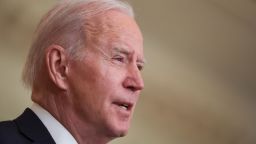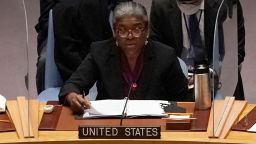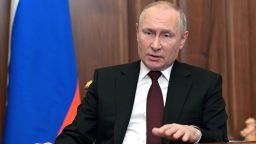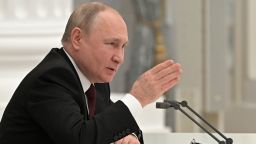What happens in the coming hours will decide how bad the Ukraine crisis gets for the vulnerable democracy in Russian President Vladimir Putin’s sights but also its potentially huge impact on Americans and an already deeply unstable world.
Whether Putin stages a full-scale invasion into all of Ukraine or limits his incursion to sending troops to two pro-Moscow regions in the east that he recognized as independent on Monday will dictate the severity of sanctions the US and its allies say will be the most consequential ever imposed on Moscow.
The question of whether he has ambitions beyond eastern Ukraine also has wider implications. His alarming speech Monday that slammed NATO for disrespecting and threatening Russia since the fall of the Soviet Union could plunge Washington and Moscow back into a new Cold War-style confrontation after 30 years of relative calm in Europe. And developments in the hours and days to come will have massive implications for Americans. A Russian invasion of the rest of Ukraine send already sending the soaring gasoline prices and inflation that have hammered wallets in the US much higher. It would also land another blow against President Joe Biden’s credibility and hand him an intractable challenge with his Democrats already at risk of huge losses in midterm election year.
The omens are very, very dark.
At the stroke of a pen Monday, Putin sliced off two more pieces of an independent, sovereign nation to add to his seizure of Crimea in 2014. Moscow said it would send what it called “peacekeepers” to the regions. Its euphemism notwithstanding, US officials fear that the force could be the vanguard of the full invasion mobilization they have predicted for days.
As bad as this flash of gangster geopolitics already is, things could get a lot worse.
If Putin were to stop here, it is possible that the Ukraine crisis could be contained, and even give the Russian President an opening to deescalate the situation and desist from a full invasion of the entire country after pocketing new territory in his quest to prevent Ukraine from moving toward the West. Such a step back – perhaps designed to divide the US from less hawkish allies – might avoid a wider global crisis. In the US, this interim scenario might also spare Americans a damaging new spike in gasoline prices and inflation and allow Biden to escape another blow to his credibility in a tough midterm election year.
Unfortunately, however, the evidence of Putin’s own furious rhetoric on Monday, the presence of up to 190,000 Russian troops on Ukraine’s borders and most assessments of US leaders and intelligence officials suggest hopes for a limited conflict are wishful thinking.
In his speech from the Kremlin, Putin made clear that he sees Ukraine as indistinguishable from Russia and not an independent entity – hardly an argument that suggests restraint. In fact, his screed came across as a justification for a far larger venture than a limited incursion into the east of the country.
He referred to Ukraine as “an integral part of our own history, culture, spiritual space” and referred to comrades, relatives and people “connected with us by blood.”
“Modern Ukraine was entirely created by Russia,” he added.
In a United Nations Security Council emergency meeting on Monday evening, US Ambassador to the UN Linda Thomas-Greenfield argued that Russia’s designation of troops it was sending to eastern Ukraine as “peacekeepers” was “nonsense.” She said the force was an “attempt to create a pretext for a further invasion of Ukraine.”
A speech that set Ukrainians on edge
Putin’s propagandistic view of history did not amount to a declaration of an invasion or an attempt to reunite Ukraine with the Motherland. But it would be easy to read it as an attempt to prepare the Russian people for war. It also surely augured a long-term effort to dominate and destabilize a democracy that includes large numbers of citizens who yearn to join NATO and the European Union.
Putin’s most chilling line came when he appeared to lay the groundwork for treating any attack on Russian forces due to enter eastern Ukraine as a pretext for a wider conflict that the US has said could kill thousands of civilians and trigger refugee flows.
“From those who seized and hold power in Kyiv, we demand an immediate cessation of hostilities,” Putin said of a government that, unlike him, was chosen in a free and fair election. “Otherwise, all responsibility for the possible continuation of the bloodshed will be entirely on the conscience of the regime ruling on the territory of Ukraine.”
Just as ominously, multiple US officials told CNN that they interpreted Putin’s move on the two eastern Ukrainian regions, which call themselves the Donetsk People’s Republic and Luhansk People’s Republic (DPR and LPR), as part of a steady march to a wider invasion of Ukraine.
“This is Potemkin politics,” a senior administration official told reporters on Monday. “President Putin is accelerating the very conflict that he’s created.”
As soon as Putin made his announcement, Biden consulted with the leaders of France and Germany and quickly announced a package of trade and finance sanctions against the two pro-Moscow regions. But he did not immediately roll out the devastating wave of measures against the Russian economy that he has promised in the event of an invasion of Ukraine. US deputy national security adviser Jon Finer told CNN’s Brianna Keilar on “New Day” Tuesday that additional sanctions were coming later in the day as part of a “swift and severe response” to Moscow’s actions.
The President got himself in some political trouble last month when he suggested that a “minor incursion” into Ukraine would not trigger the full force of the most punitive sanctions ever levied on Moscow. He inadvertently told the truth about divisions at the time between US and European allies over the exact moment when the full sanctions would turn on. Biden later clarified his comment, saying that sanctions would be triggered if “any assembled Russian units” rolled across the Ukrainian border.
But again on Monday, administration officials appeared to make a distinction between eastern Ukraine and the rest of the country. “There have been Russian forces present in these areas” since 2014, a senior official told reporters.
“So we’re going to be looking very closely at what they do over the coming hours and days and our response will be measured, according, again, to their actions,” the official said.
It was not clear whether the administration position was due to sequencing issues with allies over sanctions or whether it was seeking to preserve one last-ditch point of potential leverage with Putin. In any case, the Russian leader scoffed at the idea of sanctions in his speech.
It is prudent for the US to actually punish Russia for what it does rather than what Putin says. But the semantics over what constitutes an invasion does risk diminishing the action that the Russian President took on Monday. It is well known that what Russia has described as pro-Moscow rebels in eastern Ukraine were trained by Russia and took its orders. In effect, Putin took a piece of another country, without giving that state a say in its destiny. This is classic expansionist autocracy using ethnic justifications and false claims that Russians were being persecuted and targeted by genocide – a playbook shockingly familiar from the horror of the 1930s.
The question of what constitutes an invasion of Ukraine may soon be moot anyway. The US has accurately predicted Putin’s move through a pre-invasion checklist in recent days that includes moves in eastern Ukraine. And it may be correct again.
Pressure on Capitol Hill
The Biden administration, which has largely succeeded in building a united NATO front against Putin in recent weeks, is already facing demands from Capitol Hill for a swifter, harsher response to his land grab – even from some Democrats.
Democratic Rep. Gerry Connolly of Virginia told CNN’s Wolf Blitzer that the US needed to put down a flag and to correctly define the pending dispatch of “peacekeepers” to eastern Ukraine.
“That’s an invasion by any sense of the imagination,” he said, adding that the most consequential sanctions ever against Moscow must immediately follow.
Two leading Republican lawmakers laid into the Biden administration.
“As we’ve said for months, setting the trigger for meaningful sanctions to Russian tanks rolling across Ukraine’s border was a dangerous mistake,” said Rep. Michael McCaul of Texas, the lead Republican on the House Foreign Affairs Committee, and Rep. Mike Rogers of Alabama, the top Republican on the House Armed Services Committee.
“We must immediately impose real costs for this blatant act of aggression and flagrant violation of Ukraine’s sovereignty and territorial integrity. Unfortunately, the sanctions previewed by the White House thus far are the definition of impotence,” the two Republicans wrote.
US officials said late Monday that they expected Russian troops to start rolling into eastern Ukraine and the two rebel regions within hours.
The world will soon thereafter find out whether Putin’s bitter fury on Monday was a precursor of a wider conflagration that would effectively end the post-Cold War era and usher in a new age of tension in Europe.
That reality would require a huge rethink of transatlantic security – including the likely dispatch of thousands of US troops back to bases they left in 1990s and early 2000s. Such deployments would also complicate Washington’s desire to pivot its military might to Asia to wage a burgeoning new Cold War-style conflict against a rising superpower, China.
A prolonged geopolitical tussle with Russia would also force US and European policy makers to consider just how far Putin might try to push his effort to rewrite the borders of Europe.
“What worries me is what happens after Ukraine,” former Director of National Intelligence James Clapper said on CNN on Monday evening. “We have got a real crisis on our hands here.”
Putin’s argument, for example, that Ukrainians were blood brothers of Russians was especially worrying since it could be applied to other countries that include large numbers of ethnic Russians – including the Baltic states, Latvia, Lithuania and Estonia, which were formerly under Soviet rule. Any attempt by Putin to extend his principle there could be hugely dangerous since all are now in NATO and benefit from the alliance’s guarantee of mutual self-defense.
The next few days will show how willing Putin is to act upon his words and will begin to answer Clapper’s question. The evidence so far looks ominous.









